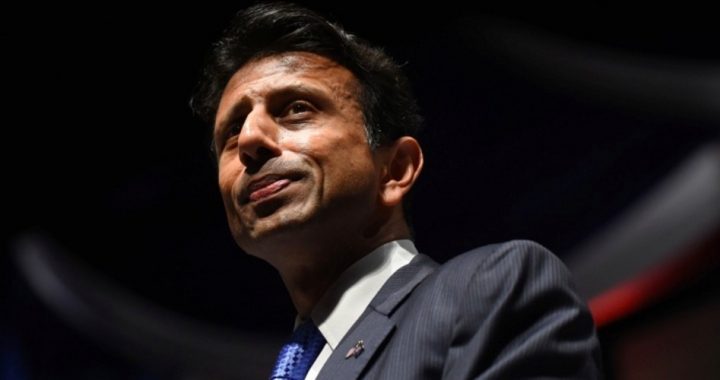
Taking a stand for religious liberty, Louisiana governor Bobby Jindal (shown) signed an executive order Tuesday granting new protections to businesses that do not wish to service faux weddings. The move came mere hours after the Louisiana House Civil Law and Procedure Committee killed a religious-freedom bill that would have accomplished the same goal.
Commenting on the legislators’ failure to act, Jindal said in a statement, “We are disappointed by the committee’s action to return the Louisiana Marriage and Conscience Act to the calendar,” reports GOP USA. Jindal continued, writes the website:
We will be issuing an executive order shortly that will accomplish the intent of HB 707 to prevent the state from discriminating against persons or entities with deeply held religious beliefs that marriage is between one man and one woman.
This executive order will prohibit the state from denying or revoking a tax exemption, tax deduction, contract, cooperative agreement, loan, professional license, certification, accreditation or employment on the basis the person acts in accordance with a religious belief that marriage is between one man and one woman.
As to why it was left to Jindal to do what the legislature wouldn’t, the Week writes that “the panel said it was concerned the so-called religious freedom bill could trigger a backlash similar to those seen in other states that pursued religious freedom laws this year. In the most high-profile case, Indiana Governor Mike Pence (R) dropped his defense of a religious freedom law and called for it to be tweaked to prohibit discrimination based on sexual orientation.”
Where Pence was weak-kneed, however, Jindal has struck a note of resolve and defiance. He stated to a cheering crowd while advocating the religious-freedom bill over the weekend, “I’ll also say this to these corporations that have told me and Louisiana they don’t want us to pass our own bill protecting the rights of individuals and businesses who support the traditional view of marriage: Don’t even waste your breath trying to bully the governor of Louisiana. We’re going to come down on the side of the First Amendment.”
While Jindal’s order might be called politics — it came just a day after he formed an exploratory committee for a potential 2016 presidential run — and might even be called bad politics, given the United States’ leftward drift, his claim is correct: He is protecting a legitimate constitutionally protected right.
The same, however, cannot be said for his opponents. While cries of “discrimination” have been very effective at cowing religious-freedom advocates, the reality is the latter’s bills simply protect a long-standing American freedom. They aren’t taking any liberty away — guilty of that trespass is the other side.
A certain fact should be made crystal clear. Opponents of religious-freedom bills are the very people making them necessary by doing something unprecedented in American history:
Forcing business owners to be party to events they find morally objectionable.
That this had never happened before cannot be over-emphasized. Anyone who appreciates freedom of association, such as economist Dr. Walter E. Williams, accepts that businessmen ought to be able to refuse service to anyone they please for any reason they may have; after all, it’s their business, created with their own money and by the sweat of their own brow. Nonetheless, discrimination against people was never the issue with respect to religious-freedom laws. For sure, the Christian businesses that have found themselves in the crosshairs in recent times have had a history of serving homosexual persons — they only balk at serving homosexual affairs.
In light of this and drawing analogies, many have asked: Would you force a Jewish or black businessman to service a Nazi or KKK event? For that matter, would anyone compel a Christian businessman to service an affair celebrating adultery or fornication? The Left clearly would not.
This brings us to a point. Anti-discrimination law has given us that 14th-Amendment violation known as “protected classes” in our supposedly classless society; these are classes — such as racial and sex-defined ones (homosexuals) — that businesses may not discriminate against. Other classes, obviously, would be “unprotected” and thus fair game. Yet now it might appear as if we also have “protected events.”
Except that it’s not that simple. Just consider these videos of Muslim bakers in Dearborn, Michigan, refusing to service faux weddings. Even though they were posted at the very time Christian bakers were being castigated in the news for acting likewise, the media was wholly uninterested. So if we couldn’t figure out the irresistible force/immovable object philosophical question, at least we now know what happens when a protected event meets a protected group.
Moreover, it isn’t just the media, either. As I reported last month, “Apple Corporation CEO Tim Cook recently inveighed against the religious-freedom laws in Indiana and Arkansas, yet he readily does business in Muslim countries that make homosexuality a crime punishable by death. It seems Cook’s principles take a back seat to his pocketbook.”
Meanwhile, Christian bakers, florists, and others have been, or risk being, put out of business simply for doing what everyone else does: Running their own business in accordance with their consciences’ dictates. So where does the truly unjust discrimination lie? In Christians who apply the same standard to all sinful events?
Or in governments that rob freedoms from some but not others, applying different standards to different “classes” of Americans?
Photo of Gov. Bobby Jindal: AP Images



